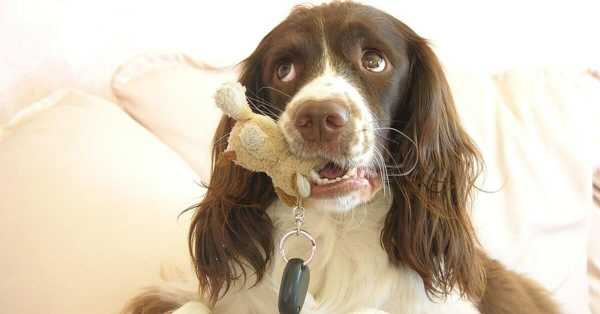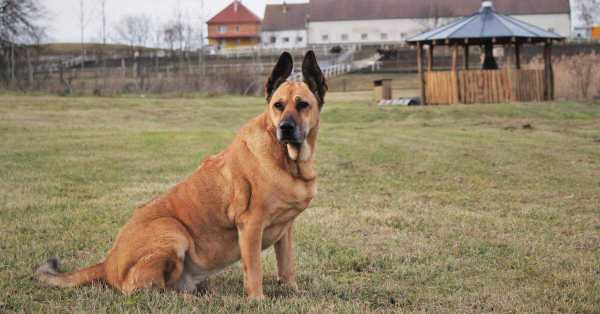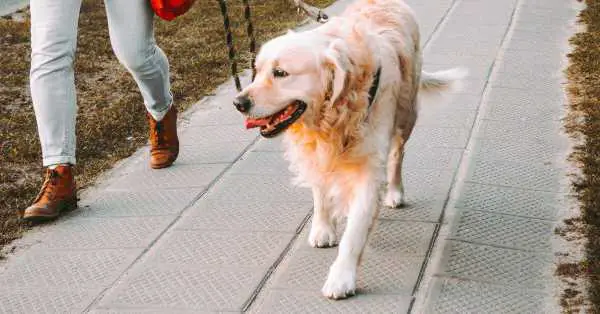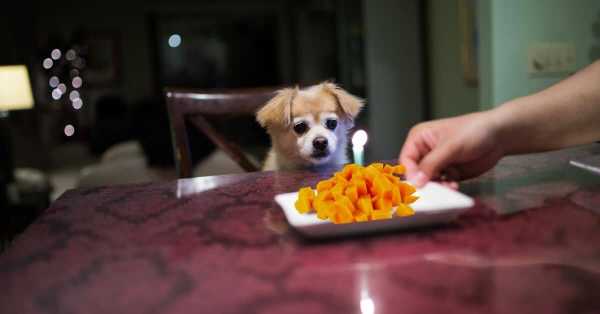This is one of the hardest things to break a dog. Nothing is more irritating than to catch your dog in the act of chewing on a shoe, pillow, or your car.
Well, maybe only Tom Hanks is unlucky enough to get a dog that eats cars. Like most bad habits, it’s the one that starts when young and is also easier to break when young.
If you never allow your puppy to chew inappropriately then you won’t have a dog chewing inappropriately.
That’s why I put this list of 17 tips to solve dog inappropriate chewing together, let me know if you find what you’re looking for.

#1 When Puppies Teethe
Your puppy is likely to start chewing about the time teething starts. The milk teeth come in at two months and will be replaced with permanent teeth around six to eight months.
This can be a painful time for puppies who may bite things to relieve the pain. If this is why your puppy is chewing on things, give him a frozen wet washcloth to gnaw on.
Do NOT attempt the whiskey cure. (You probably shouldn’t do it to human babies either.)
#2 Puppy Proofing The House
Look around the house from your puppy’s point of view. Is there anything poisonous Fido might mistake for a treat or a toy?
Chewing on electrical cords is not merely destructive; it could cause your puppy to be electrocuted. A floor cable protector is what you need in this case.
An adhesive will keep Fido from finding the cables on accident. Shoes, socks, toys and other odd items may look like something to chew on.
Put anything you don’t want Fido chewing on where he can’t get it. Also, provide your pup with someplace safe and comfortable so that he is less induced to stress chewing.
#3 Teach Fido Appropriate Chewing
Doggies gonna chew. Simple as that. Give your dog something appropriate to chew on. Do not give them old socks or shoes.
Your dog will not know the difference and soon, you won’t either. Remember that rawhide and beef bones can be chewed to bits that can be swallowed.
Chicken bones also splinter easily. Nylabones, greenies and dental chew sticks are good choices as they encourage appropriate chewing while fighting dental problems.
Balls and other chew toys may appeal to your dog but keep your dog’s size and the safety of the toy in mind. It should not be too hard, too soft, or have anything a tongue could be stuck in.
Read Also: 13 Reasons Why Dogs Rip Up And Destroy Their Beds?
#4 Discourage Inappropriate Chewing
If you catch your puppy in the act of chewing something he shouldn’t, give a calm but firm “No!”. You should take the item away and replace it with something your puppy can chew.
Constantly direct your puppy towards appropriate chew toys and praise him for using them. Some toys can be filled with food or treats. They make fun puzzles for your puppy.
How Do You Like Them Apples?
There are commercial products such as Bitter Apple that you can spray on anything you don’t want your dog chewing on. It also comes in Bitter Cherry and Bitter Orange, whichever your dog likes least.
Observe your dog around substances you’ve sprayed to see if he doesn’t like it. (Dogs, like people, have different tastes.)
If your dog drools, retches, or jiggles his head, he does not like the taste or smell and will be discouraged from trying to chew it again.

#5 Confine Fido When You’re Not Home
You wouldn’t leave a child to their own devices for a long period of time. Why expect better from a puppy?
If you must leave your pup for an extended period of time he may have to be confined to one area until he learns the rules.
There are just too many temptations for a young puppy to get into. You may have to confine him to his crate or a puppy proofed room until you get back.
Expect Fido to be very happy and excited to see you again.
#6 Rule Out Any Medical Problems
If your puppy seems a little too obsessed with chewing you may want to take him to a vet to rule out any medical problems.
The cause could be a nutritional deficiency, internal parasites, or pica. Some dogs chew as a way to cope with stress.
Pain and general malaise can cause stress that a dog may try to relive by gnawing on random items.
If your normally well-behaved dog is suddenly chewing things, see if she’s stressed out over anything. The chewing may stop if you take away the stressor.
Popular Read: 18 Essential Tips to Care For Your Dog’s Teeth
#7 Play With Your Dog
Isn’t this why you got a dog? To have someone to play with?
Your dog wants to play and needs to. He has some energy that needs to be burnt off to keep him out of mischief.
Playing not only helps your dog expend energy but it’s a great bonding experience for the two of you.
Games of fetch and tug of war can further reinforce what sort of things are appropriate to chew on.
The tug of war game is a good opportunity to teach the “drop it” command and fetch can reinforce it. More on that topic later.
[amazon box=”B089RF8MHW” template=”horizontal”]
#8 Offer Better Chewing Choices
If your dog is chewing something inappropriate, take it away and give her something better. Make sure she has plenty of her own toys and bones to choose from.
Give her something new every once in a while and replace items that have been chewed to pieces.
Chewing is normal behavior for puppies so make sure she has a plethora of good chewing choices.

#9 Let Fido Exercise
Sometimes your dog chews because he’s bored and restless. A little exercise may be what he needs to be too tired to misbehave.
In older dogs, exercise is good for making sure they don’t pack on the pounds. Get your dog in the habit of exercising by playing fetch or going on long walks or a jog.
Teaching your puppy tricks will give her mental stimulation as well as physical so you’ll take her mind off wanting to chew.
#10 Is Fido Hungry?
Could your puppy be chewing on things because he’s hungry? Some new puppies may have trouble adjusting to a regular feeding regime.
Make sure your puppy is getting the right amount of calories for his size, breed, and activity level.
An older dog who has been put on a reducing diet may be stress chewing to cope. Some exercise might put a stop to that.
Related Reading: Recommended Indestructible Dog Beds For Excessive Chewers
#11 Was Your Puppy Taken From Parents To Early?
Dogs learn when to and not to bite from their mothers. If a puppy was taken from Mama too soon, she may not have had time to teach her child better manners.
If there is simply no way to leave a very young puppy to be raised by Mama (death, illness, hyper aggression, rejection) then you have to be Mama Dog.
Some dogs chew out of separation anxiety, which is caused by premature separation from the mother dog.
#12 Why Mouthing Is Important
Remember that your dog has no hands so his mouth is the only way he can explore anything.
Licking, biting, and chewing are the few ways a dog can figure out just what something is.
It is natural and necessary for your dog to mouth items as it is for you to pick one up to look at it and perhaps manipulate it a little.
Teach your dog what is not to be chewed but also have some items available that your dog can safely chew on.
#13 Communicate With Your Dog
It is easy to miscommunicate with a dog. What you think is an expression of anger and displeasure the dog may think is an expression of excitement.
Your dog may think you’re just playing. Do not let your dog have old shoes or anything that even vaguely looks like things you don’t want your dog to chew on.
Your dog may get the idea that such things are good to chew on.
Be calm but firm in getting the idea across that you do not want Fido to chew on and only show high emotion when he chews on something you do want him to chew on.
#14 Effective Training Techniques
Use only positive reinforcement to get your dog to change his behavior. Do not punish your dog with muzzles or by holding his mouth shut.
This is only a temporary solution. It will not permanently correct the behavior. Hitting your dog will only cause them to become aggressive.
Supervise your puppy until you are very sure he’s not going to start chewing on things when you’re not looking.
Always remember to tell Fido what a good boy he is when you find him chewing on appropriate objects.
Teach Your Dog To “Drop It”
You can teach your dog to “drop it” as easily as “sit” and “lie down”. (Not “lay down” because even dogs need proper grammar.)
You can teach your dog the command while playing tug of war. This is an instinctive game for a dog.
When your dog pulls give the command word “No” or “drop it” or “let go” in a calm but firm tone.
Do not let him have the toy but do not pull on it either. When the dog realizes there is no game being played, he may let go.
The instant he lets go, reward him with a treat or by letting him have the toy.
Normally, this trick only takes a few sessions to learn but some dogs are more stubborn than others. Keep patient.
#15 Timing And Discipline
You have to catch your dog in the act in order to teach him the behavior is wrong. Finding a chewed-up item and scolding him will make him act submissive, but it won’t really teach him not to chew.
Discipline must be connected immediately to bad behavior. This means you will have to keep a close eye on your dog and see if you can catch him chewing what he shouldn’t.
Check: How Do You Get A Puppy To Come When Called?

#16 Give Fido Limits
One way to keep Fido from chewing on things you don’t want chewed on is to limit where he can go. You can use a pet gate to limit Fido’s movements.
Keep in mind that small dogs may be able to squeeze through some gates and big dogs might just destroy some gates.
A desire to escape can increase the need for stress chewing so make sure there are safe items to chew where your dog is confined.
Don’t keep the confinement for too long or you may cause more behavior issues.
This method should be used in conjunction with training until you get to a point where Fido has been trained not to chew on inappropriate items.
#17 Don’t Chase After Fido
Dogs think chasing is fun. If you chase after your dog, he will think this is all a game. You are not to run after your dog.
You are the master. The dog is supposed to come to you when called.
You can offer her a treat to come to you but he must first drop the item he is not supposed to have.
If you chase after your dog when he has something he is not supposed to have you are reinforcing bad behavior by making it into a game.
Over To You
Chewing is an instinctive behavior in dogs. You will never break it completely and could not even try to. The best you can do is teach your dog what is inappropriate to chew on and what is acceptable to chew on.
There are plenty of toys made specifically for dogs to chew on. Do some research to find out what’s safe and what your dog likes best in particular.
You may feel like doing something drastic, but be patient and not cruel. If all else fails, you may try treating inappropriate items with something that tastes bad to discourage Fido from wanting it anywhere near his mouth.
Which of the above suggestions do you think are most effective in training a dog?
I think it’s very important to keep inappropriate items where your puppy can’t get them and make sure he has enough appropriate items.
Which of these tips have you tried? Which one would you like to try?
Do you have any further recommendations? Please reply in the comments below and share this article if you like it.
Other Puppy Adoption Related Topics
1. Suggested Dog Beds For Doberman Pinschers

